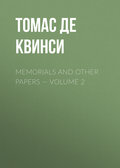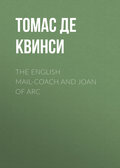
Томас де Квинси
Narrative and Miscellaneous Papers — Volume 1
Thus, after their memorable year of misery, the Kalmucks were replaced in territorial possessions, and in comfort equal perhaps, or even superior, to that which they had enjoyed in Russia, and with superior political advantages. But, if equal or superior, their condition was no longer the same; if not in degree, their social prosperity had altered in quality; for instead of being a purely pastoral and vagrant people, they were now in circumstances which obliged them to become essentially dependent upon agriculture; and thus far raised in social rank, that by the natural course of their habits and the necessities of life they were effectually reclaimed from roving, and from the savage customs connected with so unsettled a life. They gained also in political privileges, chiefly through the immunity from military service which their new relations enabled them to obtain. These were circumstances of advantage and gain. But one great disadvantage there was, amply to overbalance all other possible gain; the chances were lost or were removed to an incalculable distance for their conversion to Christianity, without which in these times there is no absolute advance possible on the path of true civilization.
One word remains to be said upon the personal interests concerned in this great drama. The catastrophe in this respect was remarkable and complete. Oubacha, with all his goodness and incapacity of suspecting, had, since the mysterious affair on the banks of the Torgau, felt his mind alienated from his cousin; he revolted from the man that would have murdered him; and he had displayed his caution so visibly as to provoke a reaction in the bearing of Zebek-Dorchi, and a displeasure which all his dissimulation could not hide. This had produced a feud, which, by keeping them aloof, had probably saved the life of Oubacha; for the friendship of Zebek-Dorchi was more fatal than his open enmity. After the settlement on the Ily this feud continued to advance, until it came under the notice of the Emperor, on occasion of a visit which all the Tartar chieftains made to his Majesty at his hunting-lodge in 1772. The Emperor informed himself accurately of all the particulars connected with the transaction—of all the rights and claims put forward—and of the way in which they would severally affect the interests of the Kalmuck people. The consequence was, that he adopted the cause of Oubacha, and repressed the pretensions of Zebek- Dorchi, who, on his part, so deeply resented this discountenance to his ambitious projects, that in conjunction with other chiefs he had the presumption even to weave nets of treason against the Emperor himself. Plots were laid—were detected—were baffled—counterplots were constructed upon the same basis, and with the benefit of the opportunities thus offered.
Finally, Zebek-Dorchi was invited to the imperial lodge, together with all his accomplices; and under the skilful management of the Chinese nobles in the Emperor's establishment, the murderous artifices of these Tartar chieftains were made to recoil upon themselves; and the whole of them perished by assassination at a great imperial banquet. For the Chinese morality is exactly of that kind which approves in everything the lex talionis:—
——'lex nec justior ulla est (as they think) Quam necis artifices arte perire sua.'
So perished Zebek-Dorchi, the author and originator of the great Tartar Exodus. Oubacha, meantime, and his people, were gradually recovering from the effects of their misery, and repairing their losses. Peace and prosperity, under the gentle rule of a fatherly lord paramount, re-dawned upon the tribes; their household lares, after so harsh a translation to distant climates, found again a happy reinstatement in what had in fact been their primitive abodes; they found themselves settled in quiet sylvan scenes, rich in all the luxuries of life, and endowed with the perfect loveliness of Arcadian beauty. But from the hills of this favored land and even from the level grounds as they approach its western border, they still look out upon that fearful wilderness which once beheld a nation in agony—the utter extirpation of nearly half a million from amongst its numbers, and, for the remainder, a storm of misery so fierce, that in the end (as happened also at Athens during the Peloponnesian war from a different form of misery) very many lost their memory; all records of their past life were wiped out as with a sponge—utterly erased and cancelled; and many others lost their reason; some in a gentle form of pensive melancholy, some in a more restless form of feverish delirium and nervous agitation, and others in the fixed forms of tempestuous mania, raving frenzy, or moping idiocy. Two great commemorative monuments arose in after years to mark the depth and permanence of the awe—the sacred and reverential grief with which all persons looked back upon the dread calamities attached to the year of the Tiger—all who had either personally shared in those calamities, and had themselves drunk from that cup of sorrow, or who had effectually been made witnesses to their results, and associated with their relief; two great monuments, we say; first of all, one in the religious solemnity, enjoined by the Dalai Lama, called in the Tartar language a Romanang, that is, a national commemoration, with music the most rich and solemn, of all the souls who departed to the rest of Paradise from the afflictions of the Desert: this took place about six years after the arrival in China. Secondly, another more durable and more commensurate to the scale of the calamity and to the grandeur of this national Exodus, in the mighty columns of granite and brass, erected by the Emperor Kien Long, near the banks of the Ily: these columns stand upon the very margin of the steppes; and they bear a short but emphatic inscription [Footnote: This inscription has been slightly altered in one or two phrases, and particularly in adapting to the Christian era the Emperor's expressions for the year of the original Exodus from China and the retrogressive Exodus from Russia. With respect to the designation adopted for the Russian Emperor, either it is built upon some confusion between him and the Byzantine Caesars, as though the former, being of the same religion with the latter (and occupying in part the same longitudes, though in different latitudes) might be considered as his modern successor; or else it refers simply to the Greek form of Christianity professed by the Russian Emperor and Church.] to the following effect:—
By the Will of God Here, upon the Brink of these Deserts,
Which from this Point begin and stretch away Pathless, treeless, waterless,
For thousands of miles—and along the margins of many mighty Nations,
Rested from their labors and from great afflictions Under the shadow of the Chinese Wall,
And by the favor of KIEN LONG, God's Lieutenant upon Earth,
The ancient Children of the Wilderness—the Torgote Tartars Flying before the wrath of the Grecian Czar,
Wandering Sheep who had strayed away from the Celestial Empire in the year 1616,
But are now mercifully gathered again, after infinite sorrow,
Into the fold of their forgiving Shepherd.
Hallowed be the spot for ever, and Hallowed be the day—September 8, 1771!
Amen.







